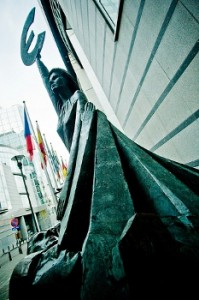Chris Gilson takes a look at the week in Brussels blogging.
The EU Centre
PolscieEU looks at the European Commission’s ‘delegated acts’, and says that they are often a source of disagreement between the Commission and the EU’s member states.
Public Affairs 2.0 looks at EU moves towards a more sustainable fisheries policy ahead of the European Parliament’s discussion of fisheries reform in September 2012.
Neelie Kroes, Vice-President of the European Commission, blogs about expanding fast broadband in Europe, taking inspiration from the Broadband for the Rural North campaign group in the UK, while Digital Europe at BlogActiv.eu looks at concerns about cyber security in Europe. Meanwhile, Jon Worth looks at what is wrong with the Commission’s web communications – mostly that there are too few companies in Brussels that are large enough to bid for the large web communications contracts.

EU Foreign policy and the European neighbourhood
European Geostrategy looks at ex-UK Prime Minister Tony Blair’s recent comments on the importance of European integration in maintaining and exercising Europe’s power on the international stage. Meanwhile, The New Federalist looks at the future of regional integration between Europe and Africa in the coming years, saying that ‘some European states will have to abandon their traditional policies towards Africa to engage in an intercontinental dialogue’.
The Euro Crisis
Eurobonds continued to dominate this week’s debates about how to solve the Eurozone crisis. Lost in EUrope says that despite French President Hollande’s support for them, for German Chancellor Angela Merkel, they remain off limits – even more so according to Open Europe after Merkel’s statement on Tuesday, that “Europe will not have shared total debt liability as long as I live”.
Despite the problems of the crisis, Europeans still very much support the Euro as a currency, according to Coulisses de Bruxelles.
Following the EU summit in Rome earlier this week, Con acento Hispano, blogging at BlogActiv.eu, says that Germany, France, Italy and Spain have agreed to implement an €130 billion growth plan for Europe. On Tuesday, Lost in EUrope looks at the new ‘master plan’ for Europe, the report, Towards a Genuine Economic and Monetary Union, but is not convinced, saying that the current draft is not likely to be the last word. Open Europe looks at how a European fiscal and banking union might work, and its implications for the UK.
Thursday and Friday this week sees an EU summit in Brussels to address the crisis. The FT’s Brussels blog has live coverage, while Morucci Europe at BlogActiv.eu describes the meeting as a summit of last resort, and Nucleus writes that Germany and France are at odds for the first time since the beginning of the crisis, 30 months ago. As the summit closes on Friday, Charlemagne’s Notebook says that the decision that Eurozone rescue funds can be used to directly recapitalize troubled banks (such as in Spain), heralds the start of a Eurozone banking union.
A Fistful of Euros makes the point that any plans for a political union in Europe need to acknowledge that transfers and redistribution of wealth and income would be a vital component of any such arrangement. Later in the week, Gianni Pitella MEP at BlogActiv.eu argues that Europe’s main problem is that it lacks a real political government.
Across Europe
The New Federalist compares Iceland’s approach to dealing with the financial crisis with Europe’s. In Iceland, those responsible for the financial disaster are investigated and prosecuted, while those in Europe remain in the financial sector.
Nada es Gratis looks at how Spain has now been essentially cut-off from the European Monetary Union due to foreign investors selling assets, and their refusals to refinance Spanish debts. Meanwhile, Open Europe says that Spanish banks could need as much as €110 billion capital injection to withstand potential losses.
And finally…
What has Herman been up to? This week he met with the President of Hungary, János Áder, The Prime Minister of Moldova, Vietnam’s Minister of Foreign Affairs, representatives of Business Europe in Brussels, the Prime Minister of Belgium, Elio de Rupo, Italy’s Prime Minister, Mario Monti.
Protesilaos Stavrou at BlogActiv.eu wonders if European politics can be ‘footballized’?
Open Europe looks at the power of Twitter in reporting the Eurozone crisis.
_________________________________
Please read our comments policy before commenting.
Note: This article gives the views of the author, and not the position of EUROPP – European Politics and Policy, nor of the London School of Economics.
Shortened URL for this post: http://bit.ly/NbSY12


